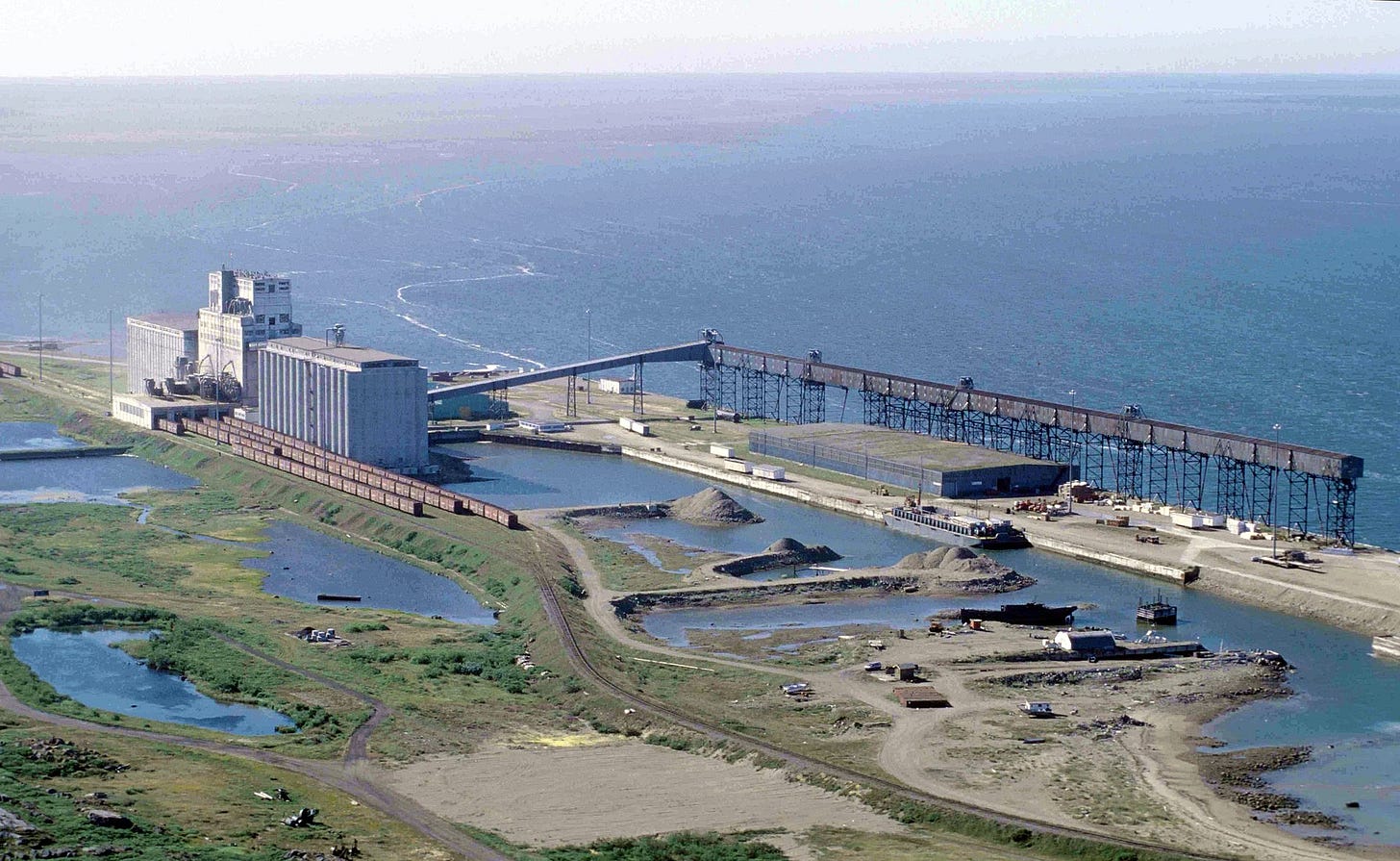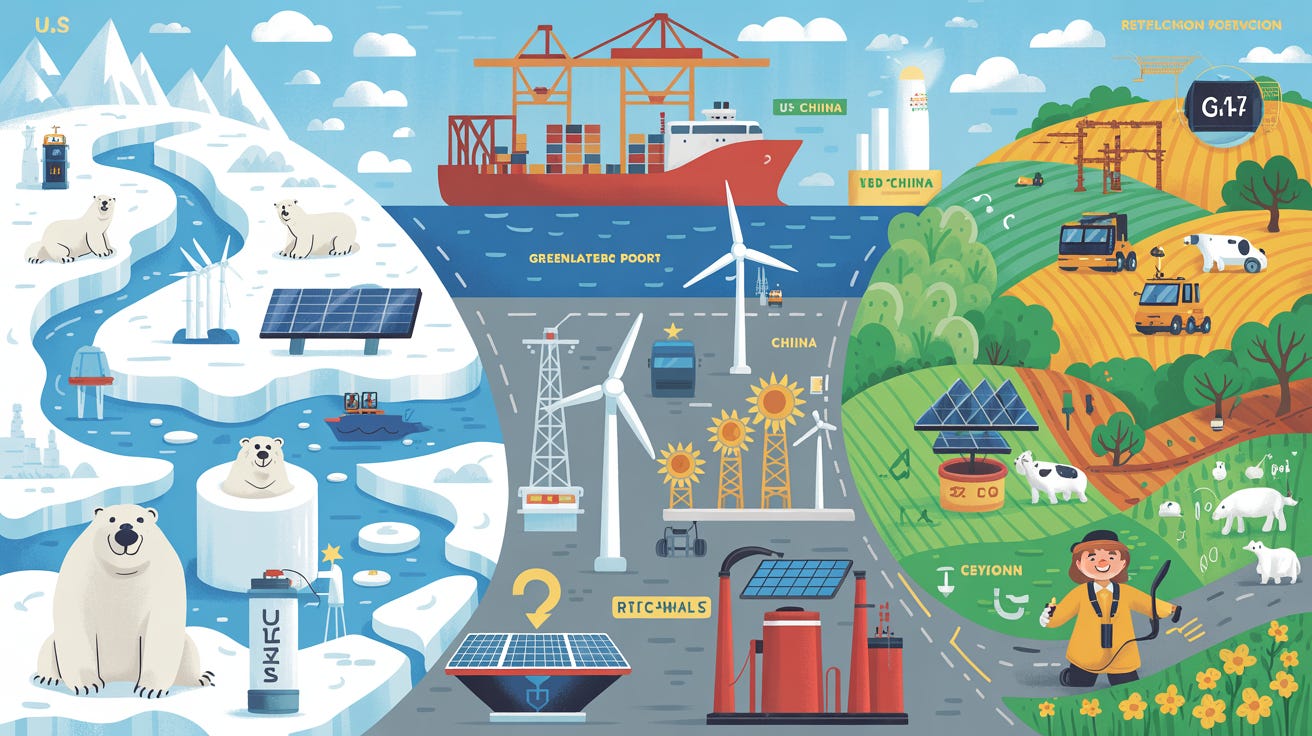The Roundup: Arctic Influence Campaign, Deepwater Ports and Carbon Fights (August 31st, 2025)
This week: Trump world comes to Greenland; MP Materials fights back against China and there's a new way to track methane emissions
Happy Sunday!
Ok fine I lied. I am going on vacation next week, not this one.
Hope you enjoy this edition!
In this edition:
Bigger Things:
Trump-tied operatives are running influence campaigns in Greenland
China deepens Rare Earth Element Quotas; MP Minerals pushes back
Canada pushes for the reopening of Port of Manitoba
Smaller Things:
Canadian watchdog warns of massive pension losses
Investors target disaster-ridden areas, looking for new investments
Cooler Things:
Methane Map
The Bigger Things
Trump-tied operatives are running covert influence campaign in Greenland, according to Denmark 🧊:
What Happened? Danish intelligence says at least three Americans tied to the Trump orbit ran covert campaigns urging Greenland to break from Denmark and deepen ties with Washington. Copenhagen hauled in the top U.S. envoy, calling any foreign meddling in the kingdom’s Arctic territory “entirely unacceptable.”
Why Care?🤷♂️ Because the race for the Arctic is heating up, and from a somewhat unexpected direction. Personally I always thought it would be China to make the first move. But, it looks like it’s the US that is making the moves. As climate change heats the Arctic, Greenland will become more important, and superpowers will feel a growing urge to push it into their orbits.
China deepens Rare Earth Element Quotas; MP Minerals pushes back:
What Happened? MP Materials, America’s top rare-earth producer, stopped shipping its key magnet metals to China in July after striking a U.S. deal that pays above-market rates for domestic processing. This move comes as Beijing imposed tighter export quotas of its own.
Why Care?🤷♂️ Because the battle for Rare Earth Elements is on, and the US is fighting back against China. While China is using its dominance over the value chain to flex its muscles and show who’s boss, MP Materials is not playing nice either. We can expect these sword-rattling exchanges to keep on getting worse, as the importance of rare earth elements grows. While this move has little to do with climate change, the importance of rare earth elements become greater thanks to the destabilizing climate.
Canada pushes for the reopening of Port of Manitoba🔱:
What Happened? Canadian Prime Minister Mark Carney confirmed federal plans to fund new port and LNG infrastructure at Churchill, Manitoba, North America’s only rail-linked deep-water Arctic port, while framing it as a half-trillion-dollar northern trade and sovereignty gambit.
Why Care? 🤷♂️ Because this is another early sign of development work being done in the Arctic. PM Carney is signaling Canada’s interest in developing infrastructure in the Arctic, perhaps in hopes it would let Canada position itself as an Arctic leader in the future. The Arctic’s importance is growing as climate change intensifies, but there’s barely anything there. Projects like this one aim to change this reality and make the Arctic “usable” in the future.

The Smaller Things
Canadian watchdog warns of massive pension losses 🍁:
What Happened? Shift Action and Ecojustice told Canada’s Chief Actuary that official models severely downplay climate shocks; research warns pension returns could plunge up to 50-60% by 2040 under high-warming scenarios.
Why Care?🤷♂️ Because we are likely going to see more impact on pensions and other forms of long-term savings by climate change. As the climate becomes less stable, the companies that pensions all over the world are invested in are exposed to increased weather risks, posing further loss risk for every day savers.
Investors target disaster-ridden areas, looking for new investments 🏠:
What Happened? A Grist investigation details how investors descend on communities ravaged by storms and fires, snapping up damaged properties at bargain prices and flipping them once values rebound, exacerbating post-disaster trauma.
Why Care? 🤷♂️ Because this is likely to happen with increasing frequency. As terrible as it may sound, it seems like some investors have found a lucrative market in the making. Climate change is making extreme weather more frequent, and this creates more “opportunities” for sophisticated investors to swoop-in and take advantage of the folks trying to rebuild their lives.
Swedish government and forest industry are at odds over carbon policy:
What Happened? Sweden floated paying landowners to postpone logging for at least five years, monetizing trees’ carbon-sink value and helping Sweden hit EU removal targets, but forestry groups warn it endangers timber supply and rural jobs.
Why Care? 🤷♂️ Because reducing emissions is like fighting a million small battles. Governments are looking for incentive-based, innovative solutions to reduce emissions. Those do not come cheap, and often risk unintended consequences. Still, the financialization of carbon seems almost inevitable, with every day someone else is trying another way to use money to prevent people from harvesting resources. Happens, I guess.
The Cooler Things
Methane emissions just got a new map⚡
Maps are fun, and people love them. You have something abstract and complex to share? Make a map!
That’s why PSE Healthy Energy has released a new Methane Risk Map that help you see “super-emitter” events as they take place.
The Methane Risk Map is a new and cool way to visualize how one of the most potent greenhouse gases known to mankind is released into our atmosphere, and from where. It’s an excellent resource for researchers, policymakers and every day people like me.
Check it out here.
AI-ify the News
As always, here’s an AI-generated picture that should somehow summarize the news. Whether it’s successful or not is up to you to decide.
That’s it for this edition of News Reconfigured.
Stay tuned for my new hot take on Tuesday, and see you soon next week!
…oh, and don’t forget to subscribe - it would mean a lot! 🔽






